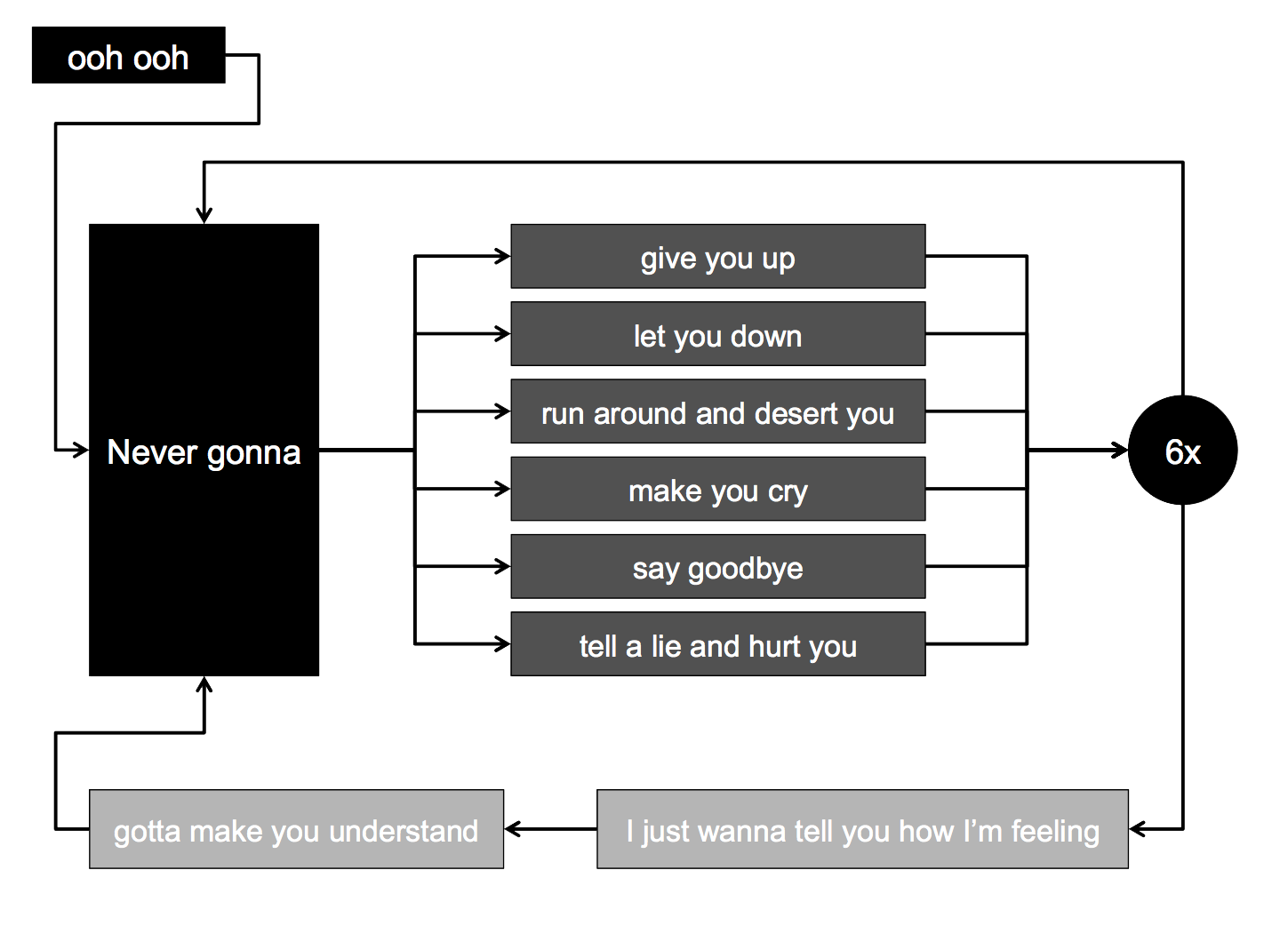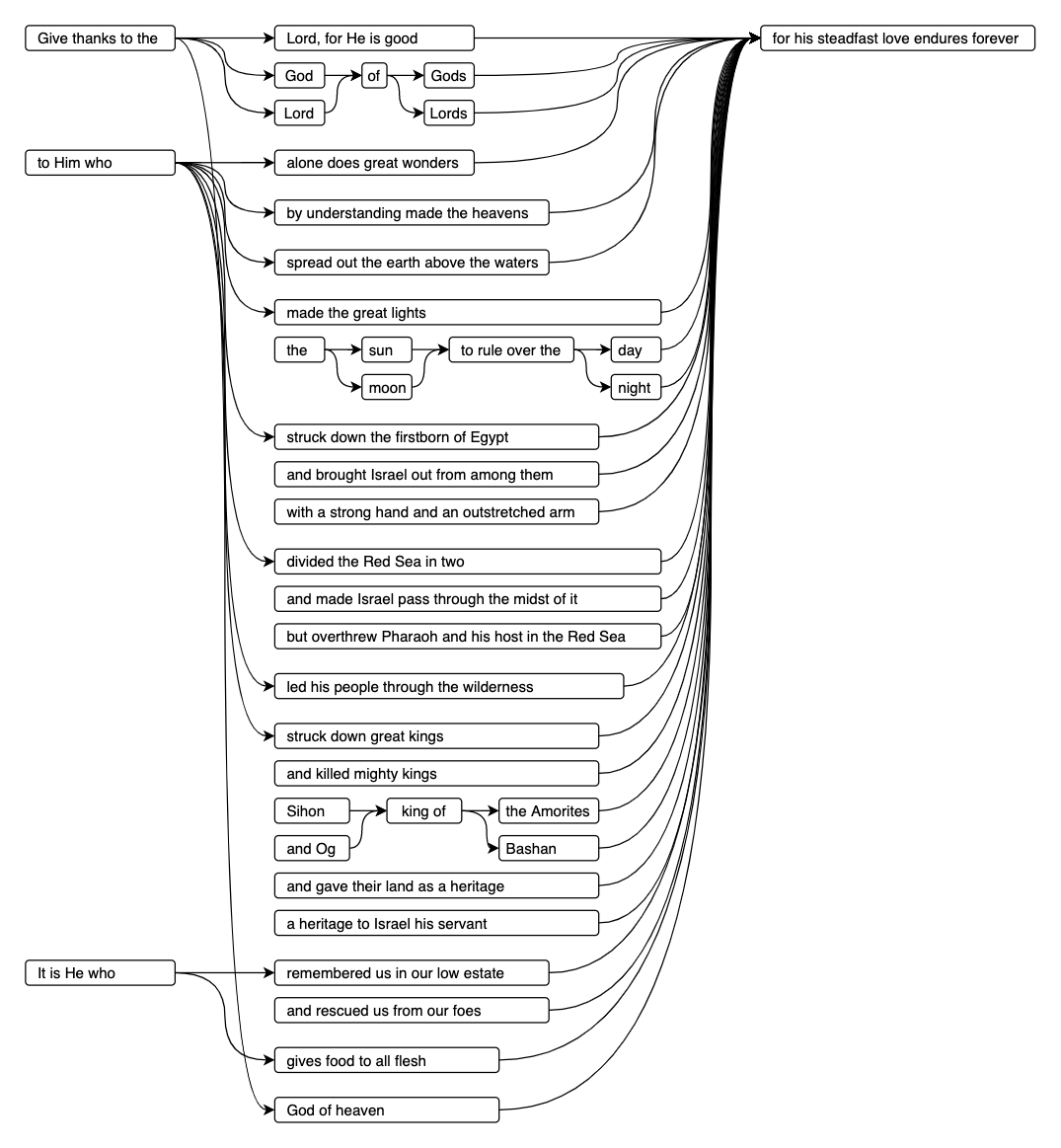Two New Ways To Read Psalm 136
Psalm 136 has the most obvious call-and-response structure in Scripture. You may know that some of the psalms were written for audience participation; your hymnal might even have a psalter at the back that clarifies which part should be read by the Leader and which by the Congregation.
But Psalm 136 needs none of that. Here, just listen to the first three verses:
Give thanks to the Lord, for he is good,
for his steadfast love endures forever.
Give thanks to the God of gods,
for his steadfast love endures forever.
Give thanks to the Lord of lords,
for his steadfast love endures forever;
The drumbeat of “his steadfast love endures forever” leaves no question as to the theme of this psalm. As the leader tells the story of God, the congregation affirms that every step of God’s story spotlights His great love toward us.
During your daily devotion, when you get to this psalm, you should probably go find someone else to read it with. Read it twice: once where you read the call and they respond, and once where they read the call and you respond.
But maybe your devotion happens early in the morning, and nobody else is awake, and you want to fully experience this psalm anyway. Maybe you feel a little awkward asking someone else to help you read the Bible. Maybe you’re me.
To help, I put together two new ways to consider this psalm.
Reformat the Response
The first, and most obvious way, to look at this psalm is the way it was always intended: as a call-and-response. Most Bible versions format it like I did the first time, indenting the response on a line below the call. But I find that it’s hard to keep the thread that way, reading both parts myself. So in the table below, all I’ve done is organize the text. Now you can see both parts:
- The call telling the story of God and His people.
- The constant, repetitive, unceasing response of God’s love.
| Call | Response | |
|---|---|---|
| 1 | Give thanks to the Lord, for he is good, | for his steadfast love endures forever. |
| 2 | Give thanks to the God of gods, | for his steadfast love endures forever. |
| 3 | Give thanks to the Lord of lords, | for his steadfast love endures forever; |
| 4 | to him who alone does great wonders, | for his steadfast love endures forever; |
| 5 | to him who by understanding made the heavens, | for his steadfast love endures forever; |
| 6 | to him who spread out the earth above the waters, | for his steadfast love endures forever; |
| 7 | to him who made the great lights, | for his steadfast love endures forever; |
| 8 | the sun to rule over the day, | for his steadfast love endures forever; |
| 9 | the moon and stars to rule over the night, | for his steadfast love endures forever; |
| 10 | to him who struck down the firstborn of Egypt, | for his steadfast love endures forever; |
| 11 | and brought Israel out from among them, | for his steadfast love endures forever; |
| 12 | with a strong hand and an outstretched arm, | for his steadfast love endures forever; |
| 13 | to him who divided the Red Sea in two, | for his steadfast love endures forever; |
| 14 | and made Israel pass through the midst of it, | for his steadfast love endures forever; |
| 15 | but overthrew[a] Pharaoh and his host in the Red Sea, | for his steadfast love endures forever; |
| 16 | to him who led his people through the wilderness, | for his steadfast love endures forever; |
| 17 | to him who struck down great kings, | for his steadfast love endures forever; |
| 18 | and killed mighty kings, | for his steadfast love endures forever; |
| 19 | Sihon, king of the Amorites, | for his steadfast love endures forever; |
| 20 | and Og, king of Bashan, | for his steadfast love endures forever; |
| 21 | and gave their land as a heritage, | for his steadfast love endures forever; |
| 22 | a heritage to Israel his servant, | for his steadfast love endures forever. |
| 23 | It is he who remembered us in our low estate, | for his steadfast love endures forever; |
| 24 | and rescued us from our foes, | for his steadfast love endures forever; |
| 25 | he who gives food to all flesh, | for his steadfast love endures forever. |
| 26 | Give thanks to the God of heaven, | for his steadfast love endures forever. |
If the psalms teach us how to pray, this one teaches us to remember God’s love in creation, miracles, war, and even our daily bread. When the Bible teaches the same lesson twenty-six times in a row, we should listen.
Flowcharting the Psalms
Several years ago, the Internet decided it would be fun to turn various repetitive pop songs into flowcharts. For example, everyone’s least favorite song looks like this:

On one hand, it kind of reduces the visceral impact of the song—rhythm, melody, harmony, time, timbre, and emotion disappear into the cold black-and-white of systems engineering.
On the other hand, the structure of the song has never been more clear. What happens when we do the same thing to this psalm?

Three features of the psalm immediately stand out:
- It starts and ends with giving thanks.
- It’s all about God: who He is and what He has done for us.
- Everything God does comes from His steadfast love which endures forever.
If you skip all the stuff in between—you shouldn’t! It’s great stuff!—you learn these three eternal truths about God. I think we’ve succeeded, and I am delighted.




